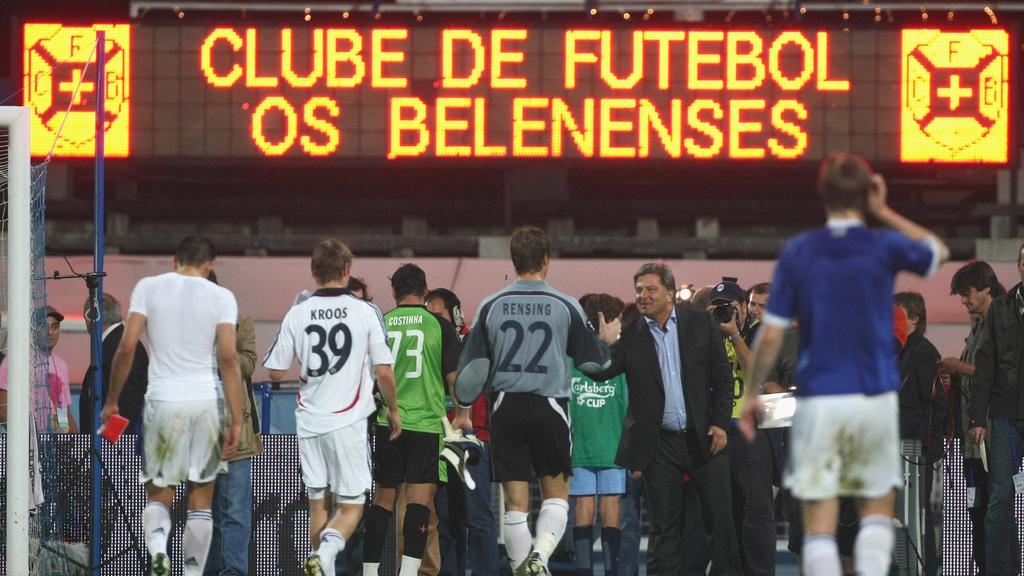Split between fans and owners rips apart historic Portuguese club

It is the story of a group of supporters who have had their club taken away from them and launched a new team in Portugal's sixth tier, leaving a professional outfit to play in a deserted stadium with a new name and logo.
The club is Belenenses, the historic outfit from the Lisbon district of Belem, famous for its monastery, egg tarts and the iconic tower by the River Tagus dating back to the 16th century.
Nearby, up the hill in leafy Restelo, the 20,000-seat stadium of the same name plays host to a Sunday amateur game in the Lisbon district league.
With a team of homegrown youngsters and before a decent crowd, Belenenses ease to a 3-0 win over Operario, a neighbourhood side from the Portuguese capital. They are top of the league.
There wearing his scarf sporting the cross of the Order of Christ -- the symbol of the club in reference to the navigators who set off from Belem in their Caravels on voyages of discovery -- Fernando Nunes struggles to hold back the tears as he discusses the club's collapse.
He is 82 now and remembers when Belenenses won the league in 1946, one of only two occasions when the title went to a club other than the three giants of Portuguese football in Benfica, Porto and Sporting.
"Our history has been tarnished, but Belenenses will overcome this crisis and get back to where they belong, in the first division," he told AFP.
The previous day, also wearing blue, the professional version of Belenenses beat the mighty Benfica 2-0 in the top flight, but they had hardly any fans there to witness the occasion.
"Those who support the professional team don't have a love of the club, they don't represent Belenenses," insists Luis Pinheiro, one of the veterans of the 'Furia Azul 1984' ultras who have remained faithful to the historic club that will celebrate its centenary in 2019.
Two separate teams called Belenenses have existed since 84 percent of "socios" (members) decided to split from the owner to whom they had ceded a majority shareholding in 2012.
As a result, the professional outfit were forced to move in the summer to Portugal's run-down National Stadium, the venue where Celtic beat Inter Milan in the 1967 European Cup final and which still hosts the Portuguese Cup final.
This version of Belenenses is backed by a set of young ultras, although the group's leader Rita Louro says some of the old "socios" have come on board as well.
"It hurt me to leave Restelo, but here we are still Belenenses. There is no reason for us to stop supporting them," says Louro, 25.
Selling the club to a company called Codecity was a way for Belenenses to bring down debts of nine million euros ($10.3 million). The club then hoped to buy back its shares via an agreement negotiated beforehand.
But that agreement was nullified in 2017, denying the "socios" any control over the team's future destiny.
The situation is symbolic of changes to how Portuguese clubs are run -- they were once the property of their members but are now equivalent to limited companies after a reform intended to better supervise club finances.
The bitter split at Belenenses even led to hot water and power being cut off in the professional team's dressing room before the official divorce was enacted in June.
"The 'socios' are happy again after voting to separate," says Patrick Morais de Carvalho, the president of the historic club, who hope to be back in the top flight within five years.
Meanwhile, Codecity director Rui Pedro Soares believes he saved the club from bankruptcy.
"I don't want to talk any more about the amateur team. My sponsors and economic partners don't allow me to say any more," he said, irritatedly, in an interview with AFP.
However, a Portuguese court recently gave the professional club one month to change its name and logo, a decision perceived as a victory for the historic team who are desperate for the "fake Belenenses" to disappear.
And to one day return to where they feel they belong.





